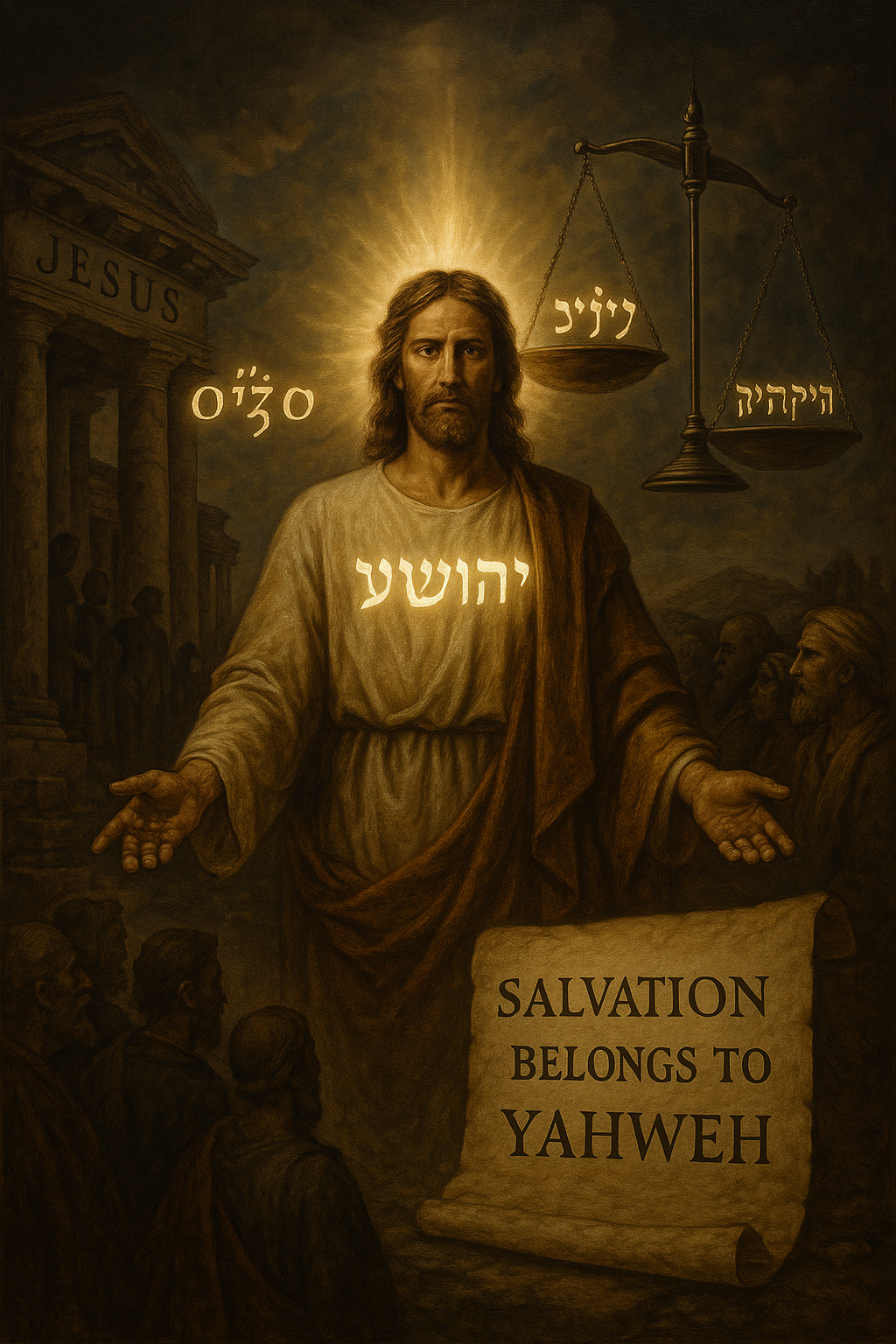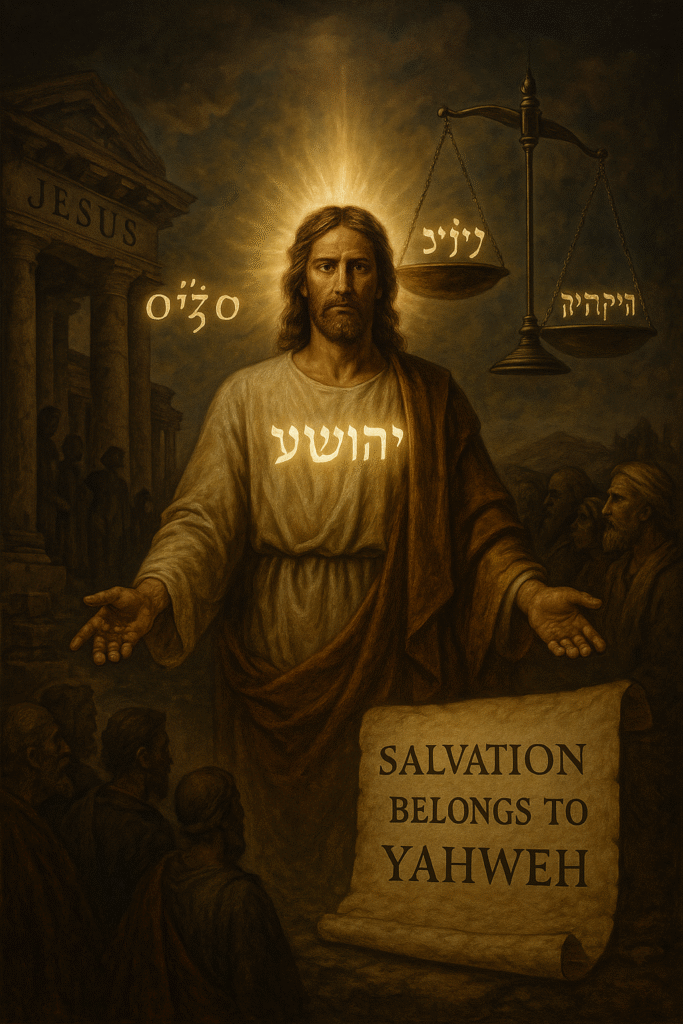Physical Address
304 North Cardinal St.
Dorchester Center, MA 02124
Physical Address
304 North Cardinal St.
Dorchester Center, MA 02124
With Michael Walker
With Michael Walker

To Whom it may concern…

Salvation is not a word to be handled lightly, and it is not a doctrine to be wrapped in religious sentiment or watered down to fit human comfort. It is not a concept we get to redefine, rebrand, or institutionalize. It is the very line between life and death, between covenant and curse, between wholeness and destruction. From Genesis to Revelation the Word of God declares without hesitation or confusion that salvation belongs to Yahweh, that He alone is Savior, and that His salvation is revealed and secured through the covenant Name of His Anointed, Yehoshua. There is no other way, no other avenue, no other possibility of rescue, healing, deliverance, preservation, or safety outside of this Name. It is not poetic, it is not abstract, it is not relative. It is blunt, sharp, absolute, and final. And because it is final, the counterfeits must be exposed. The English compromise must be exposed. The imperial man-made Greco-Roman institutionalized counterfeit must be exposed. And the covenant Name must be restored without apology, without trimming edges, without fear.
The problem begins with the English compromise. In our modern English Bibles, “saved” and “salvation” are flattened into thin religious terms, hollow shells that barely carry the weight of what the Greek originally declared. In the New Testament, the verb used is σῴζω (sōzō), meaning to save, to deliver, to preserve, to make whole, to heal. It is an active word, a word of rescue, restoration, wholeness, and healing. It is not simply fire insurance for the afterlife, it is the full action of Yahweh stepping into the brokenness of humanity to restore body, soul, and spirit. The noun σωτηρία (sōtēria) carries this even further, meaning salvation, deliverance, preservation, safety. The word σωτήρ (sōtēr) names the Savior, the rescuer, the deliverer Himself. Yet in English, “saved” has been boiled down to a cheap slogan. The consequence is devastating: covenant wholeness reduced to an altar call formula, salvation treated as a paper certificate of heaven rather than a living covenant with Yahweh through Yehoshua. To reduce σῴζω to “saved” alone is like reducing the act of a surgeon removing a tumor, sewing the wound, restoring the body, and breathing life into the lungs to nothing more than “helped.” The word is gutted of its force. This is compromise, and compromise always opens the door for counterfeit.
This leads us directly into the counterfeit. Acts 4:12 declares that there is salvation in no one else, for there is no other name under heaven that has been given among mankind by which we must be saved. This is the bluntest verse in the New Testament. There is no wiggle room, no possible second option, no alternative name that can rescue. Joel 2:32, echoed in Acts 2:21 and Romans 10:13, says everyone who calls on the name of the Lord-(Yehoshua) will be saved. John 17 shows Yehoshua Himself declaring that He manifested the Name of the Father, that He kept people in the Name, that the Name is the locus of covenant preservation. Yet history shows us how quickly this was twisted into a counterfeit, powerless, imperial, man-made, Greco-Roman, institutionalized title. Salvation is not institutional, not imperial, not Greco-Roman. It is covenantal, Spirit-breathed, and Name-specific. To swap out the Name is to sever the covenant. To stand under a substitute is to stand outside the covenant. And while Acts 17:30 says that times of ignorance may once have been overlooked, now that truth is revealed, ignorance is no longer an excuse.
Here we must stop for a necessary linguistic lesson. The true covenant Name is Yehoshua, יְהוֹשֻׁעַ, pronounced yeh-HO-shoo-ah. It means “Yahweh saves,” binding the Tetragrammaton itself to the act of saving. When carried into Greek, the closest possible rendering was Ἰησοῦς (Iēsous), pronounced ee-ay-SOOS. The Greeks did not possess the same sounds as Hebrew, and so they used the letters available to them to preserve as closely as possible the sound of the Name. This was not a replacement. It was not an abandonment of the covenant syllables. It was a symbolic attempt to preserve the audible Name of Yehoshua in Greek speech and script. It was an arrow pointing back to the true Name. The corruption came later, when this was funneled through Latin and English until the syllables were stripped and what emerged was “Jesus.” This is not a translation. This is not a transliteration. This is not a synonym. This is a counterfeit construction, the byproduct of an imperial Church that had more concern for its Greco-Roman cultural dominance than for covenant fidelity.
The analogy is painfully simple. Imagine a man named David, introduced to you by his mother, his father, and his wife as David. Imagine that you say, “David doesn’t fit my culture. In my tongue I’ll call you Diego.” Imagine going further and saying, “David’s name doesn’t sound like my skin color, so I’ll just call you something that makes me feel more comfortable.” This is not respect, it is not translation, it is not accommodation. It is mockery. It is rejection of identity. It is a refusal to honor. The Name of Yehoshua is not ours to bend, whiten, soften, or culturalize. It is not for Rome to rename. It is not for England to refashion. It is not for America to abbreviate. To call someone out of their name is to dishonor them. To change someone’s name because you dislike how it sounds in your mouth is to spit in their face. To insist on calling Yehoshua by a counterfeit title forged in Greco-Roman halls is to deny the covenant embedded in His Name.
And now we turn to the canonical pipeline of salvation. The Word of Yahweh leaves no room for doubt. Genesis 3:15 gives the first promise: the seed of the woman will crush the serpent’s head. Genesis 12:3 and 22:18 declare that in Abraham’s seed all nations will be blessed. Genesis 49:10 says the scepter will not depart from Judah, the ruler to whom nations will obey. Genesis 49:18 cries, “For Your salvation I wait, O LORD.” Exodus 14:13 commands, “See the salvation of the LORD.” Deuteronomy 18:15–19 promises a prophet like Moses, to whom we must listen. 1 Samuel 2:1,10 exalts Yahweh as Savior who gives strength to His king. 2 Samuel 22:2–3 names Yahweh “God of my salvation.” The Psalms cry out repeatedly, “Salvation belongs to the LORD-(YHWH)-(Yahweh)” (Psalm 3:8), “The LORD is my light and my salvation” (Psalm 27:1), “My salvation is from Him” (Psalm 62:1–2), “God is to us a God of deliverances” (Psalm 68:19–20), “The LORD has made known His salvation” (Psalm 98:2), “The stone the builders rejected has become the chief corner stone” (Psalm 118:22). Isaiah 7:14 and 9:6–7 declare a child-king will be born. Isaiah 11 describes the Branch from Jesse. Isaiah 12:2–3 proclaims, “God is my salvation.” Isaiah 25:9 says, “This is our God; let us rejoice in His salvation.” Isaiah 40:3–11 speaks of Yahweh Himself coming. Isaiah 42:6–7 and 49:6 call the Servant a covenant and a light of salvation to the nations. Isaiah 52:10 proclaims, “All the ends of the earth will see the salvation of our God.” Isaiah 53 reveals the Servant bearing iniquities and justifying many. Isaiah 59 says Yahweh’s own arm brought salvation. Jeremiah 23 and 33 describe the Branch of righteousness, Yahweh our righteousness. Ezekiel 36 promises new hearts and new spirits. Daniel 7 reveals the Son of Man with eternal dominion. Hosea 13:4 declares, “There is no savior besides Me.” Joel 2:32 promises, “Everyone who calls on the name of the LORD will be saved.” Jonah 2:9 cries, “Salvation is from the LORD.” Micah 7:7 waits for “God my salvation.” Zechariah 9:9 shows a king coming with salvation. Zechariah 12:10 shows Yahweh pierced. Malachi 3:1 promises Yahweh suddenly coming to His temple.
The Gospels confirm the promise fulfilled. Matthew 1:21: “You shall call His name Yehoshua, for He will save His people from their sins.” Luke 1:47: “God my Savior.” Luke 1:69–77: “A horn of salvation.” Luke 2:11: “A Savior has been born.” Luke 2:30: “My eyes have seen Your salvation.” John 1:12: those who believe in His Name are given authority. John 3:14–18: eternal life to those who believe in the Name of the Son. John 4:42: “This One is indeed the Savior of the world.” John 10:9: “If anyone enters through Me, he will be saved.” John 14:6: “No one comes to the Father but through Me.” John 17:6,11–12,26: Yehoshua manifests the Name, keeps people in the Name.
Acts proclaims the Name without hesitation. Acts 2:21: “Everyone who calls on the name of the Lord will be saved.” Acts 2:38: be baptized in the Name. Acts 3:16: faith in His Name brings restoration. Acts 4:12: “There is no other name.” Acts 10:43: forgiveness in His Name. Acts 13:38–39: justification through this Man. Acts 16:31: “Believe in the Lord Yehoshua, and you will be saved.” Acts 22:16: “Wash away your sins, calling on His Name.”
The epistles anchor this truth. Romans 1:16, Romans 3:21–26, Romans 5:9–10, Romans 6:23, Romans 8:1–4, Romans 10:9–13. First Corinthians 1:2, 18, 30; 6:11. Second Corinthians 5:18–21. Galatians 2:16. Ephesians 1:7,13; 2:8–9. Philippians 2:9–11. Colossians 1:13–22. First Timothy 2:5–6. Titus 2:11–14; 3:4–7. Hebrews 2:3; 5:9; 7:25; 9:12,28; 10:10. James 1:21. First Peter 1:9–21; 3:21. First John 5:11–13. Jude 25. Each passage repeats the same foundation: salvation is in Yehoshua, salvation is in His Name, salvation is through His blood, salvation is not in works, salvation is in covenant grace.
Revelation crowns the message. Revelation 1:5–6: He released us by His blood. Revelation 5:9: He purchased us from every nation. Revelation 7:10: “Salvation to our God and to the Lamb.” Revelation 12:10–11: “Now the salvation of our God and the authority of His Messiah have come.” Revelation 19:1: “Salvation belongs to our God.” Revelation 21:6 and 22:17: the water of life freely given.
In His Name we are saved, delivered, preserved, made whole, healed. In His Name we are given salvation, deliverance, preservation, safety. In His Name we find the true Savior and Rescuer. This salvation is not counterfeit, not powerless, not imperial, not man-made, not Greco-Roman, not institutionalized. This salvation is covenantal, Spirit-infused, rooted in Yehoshua, “Yahweh saves,” confirmed from Genesis to Revelation.
Therefore the call is blunt. Renounce the counterfeit. Renounce the powerless title. Renounce the imperial Greco-Roman construct. Return to the covenant Name. Call upon Yehoshua. Believe. Confess. Be immersed into His Name. Walk by His Spirit in wholeness, deliverance, preservation, safety. Demonstrate this salvation inwardly through transformation, outwardly through witness, and divinely through authority.
The conclusion cannot be softened. To call Yehoshua by another name is to stand outside His covenant. To trust in an institutional counterfeit is to trust in man and not in God. To reduce salvation to a shallow English word is to gut it of its power. The Name Yehoshua is not optional, it is essential. It is not a suggestion, it is the very covenant key. Just as you cannot expect your spouse to answer when you continually call them by the wrong name, just as you cannot honor a man while spitting on his identity, you cannot expect salvation while refusing the covenant Name. The whole canon testifies: salvation belongs to Yahweh. Salvation is revealed in Yehoshua. Salvation is sealed by His Spirit. Salvation is consummated in the Lamb. And there is no other name under heaven by which we must be saved.
This is the truth. This is the line. You are either saved, or you are not. There is no middle. There is no compromise. There is no poetry to soften it. Call on Yehoshua and be saved. Call on Jesus and remain lost. The choice is absolute, and eternity hangs on it.